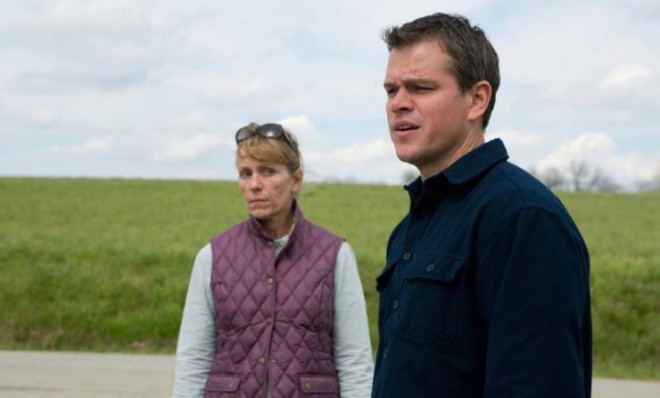Is Promised Land unfair to the energy industry?
The new Matt Damon film, which tackles the controversy over hydraulic fracturing, has fracking fans crying foul


A free daily email with the biggest news stories of the day – and the best features from TheWeek.com
You are now subscribed
Your newsletter sign-up was successful
Promised Land, a Matt Damon-starring drama that hits movie theaters today, tells the story of a small town debating whether to allow a corporation to use its hydraulic fracturing (or "fracking") process to extract energy from their land. (Watch a trailer for Promised Land below.) Of course, over the past few years, fracking has become a hugely contentious issue pitting environmentalists — who argue that the process can have a devastating impact on the Earth — against industrialists, who argue that the process is a fair and relatively non-threatening way to draw oil and natural gas from land. Unsurprisingly, some in the energy industry have expressed concern that Promised Land will mark a permanent shift in the public opinion war over fracking. Does Promised Land offer genuine insight into the fracking debate, or is it unfairly stilted?
Promised Land is pretty fair to both sides — until the end: "It's easy enough to label Promised Land as the "anti-fracking movie" because, ultimately, that's what it becomes," says James Berardinelli at ReelViews. But for the majority of its runtime, the film actually attempts to offer "an evenhanded look at the issues associated with fracking," with Matt Damon's pro-industry character making a compelling case that the economic benefits for the townspeople override any possible environmental concern. But the film's abrupt shift into a preachy, cartoonish finale throws out any semblance of nuance in favor of a blatant anti-fracking message.
Even Promised Land's anti-fracking argument isn't very convincing: Promised Land may feature a strong cast, but "the star power is deceiving, and the energy companies might be smarter to ignore the film than fan the controversy by attacking it," says Liam Lacey at The Globe and Mail. "This film’s depth of insight into the practice of fracking is, literally, presented at a primary-school level," as one of the film's environmental activists tells a first grade class that chemicals can hurt water and animals. Fracking is a complicated issue that deserves an honest debate, and "it's a shame Promise Land doesn't put up a better fight."
The Week
Escape your echo chamber. Get the facts behind the news, plus analysis from multiple perspectives.

Sign up for The Week's Free Newsletters
From our morning news briefing to a weekly Good News Newsletter, get the best of The Week delivered directly to your inbox.
From our morning news briefing to a weekly Good News Newsletter, get the best of The Week delivered directly to your inbox.
And it isn't likely to encourage a serious debate: Promised Land illustrates "the potential pitfalls of narrative political cinema," says Jason Bailey at Flavorwire. If filmmakers want to make politically themed movies, "it must be done with more subtlety and tact than in Promised Land," which preaches to the choir by delivering its final moral "unambiguously and without much in the way of complexity." A serious narrative film that tackles fracking could (and should) still be made, but it would need to have the courage to present all the facts and let viewers come to their own conclusions.
Consensus: Promised Land is an anti-fracking film — but it's too preachy and simplistic to make a serious and substantive case.
A free daily email with the biggest news stories of the day – and the best features from TheWeek.com
Scott Meslow is the entertainment editor for TheWeek.com. He has written about film and television at publications including The Atlantic, POLITICO Magazine, and Vulture.
-
 Political cartoons for February 15
Political cartoons for February 15Cartoons Sunday's political cartoons include political ventriloquism, Europe in the middle, and more
-
 The broken water companies failing England and Wales
The broken water companies failing England and WalesExplainer With rising bills, deteriorating river health and a lack of investment, regulators face an uphill battle to stabilise the industry
-
 A thrilling foodie city in northern Japan
A thrilling foodie city in northern JapanThe Week Recommends The food scene here is ‘unspoilt’ and ‘fun’
